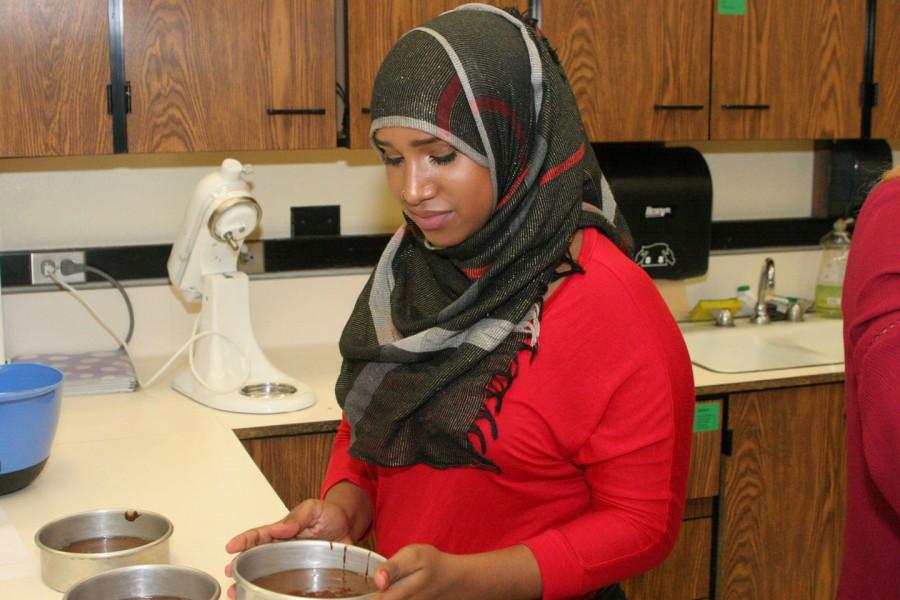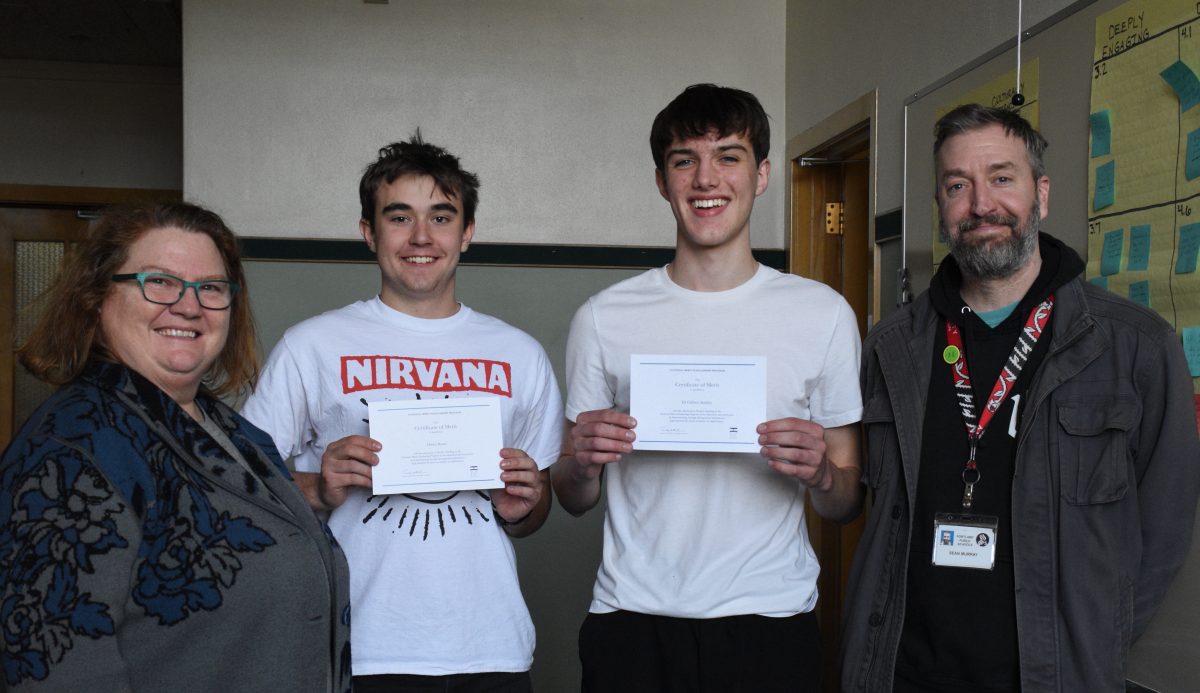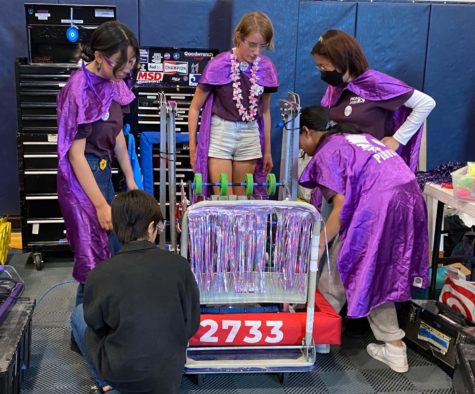Class changes in store for students next year
Clarion photo Ian Legros
Whipping up some cake- Junior Biftu Amin bakes in cooking.
February 17, 2016
The auditorium’s remodel is coming to a close, but Cleveland isn’t settling down. Administrators, teachers, and counselors are now discussing renovating the course offerings.
Among many changes, next year there will be a change in sequencing for required classes and several new elective classes, including ones that are semester-long.
Change in sequencing
Health
After this year, there will be a change in sequencing for health class. Instead of having a full year of health sophomore year with eight topics covered, students will take a semester of health their freshman year and will only comprise of three topics: sexual health, emotional health, and drug and alcohol addiction. The second semester, students will complete College and Career class. They will finish their full credit of health sophomore, junior, or senior year with five different “selective” options. Students will be able to choose between Crossfit Endurance and Nutrition, Human Sexuality and Healthy Relationships, Mindful Studies, Risk Reduction/First Aid and CPR, and Sports and Health occupations. These courses will fulfill the second half-credit of health and will be taught by various teachers, including Gaye Chapman, Cara Cocciarella, Kendra Gardner, Chase Franks and Anna Kate Peterson.
“Health is a deep subject and we’re looking at this change to provide more tools for freshmen to not only cope, but be successful in high school,” Principal Tammy O’Neill said. In a report to Cleveland families, O’Neill quoted, “…freshmen need to have access to the essential Health content standards that promote mental, social, physical, and emotional health.”
Although this modification provides students with more options when fulfilling their health credit, it also presents several challenges.
“Camille Adana and I are concerned that we’re not going to be with freshmen the entire year to build relationships and a core community in our classroom,” health teacher Gaye Chapman said. She added, “Right now we’re both a little hesitant because we don’t know what it’s going to look like and if having them for only one semester will be long enough to give them everything they need.”
However, O’Neill believes the earlier students are exposed to the material, the better. “I think getting the tools and information in front of kids for a semester is better than not at all,” said O’Neill.
Both O’Neill and the health teachers are in favor of extending health to a full year for freshman. “It would be great to combine CCE and health class; integrating those two classes would be really organic…that would be my rainbow world,” O’Neill said.
There is also a concern that students won’t learn about all the health topics. For example, if a student decides to enroll in the crossfit endurance & nutrition selective, they won’t learn about risk reduction, first aid & CPR, and more.
“I see that it could really benefit freshmen to concentrate on these three areas. But I’m also hesitant because now I’m going to miss out on that full year experience that I love where we discuss a range of subjects,” Chapman said.
“I go so in-depth that it’s going to be sad if I have to minimize,” Adana said. “Those topics and issues are about feeling safe to have in-depth conversations about, and that requires time and a sense of comfort with peers.”
Another challenge with the semester class is that teachers will be teaching the material numerous times throughout the year. Instead of going through the material four times, teachers will do it eight times. “I don’t like being desensitized with my own material because I think it’s so critical for students to get the real feeling behind it,” Adana said.
Adana and Chapman said teaching freshmen instead of sophomores will be a big change.
“I think I’m going to be way more vulnerable. I think I may have to change some of my policies and my teaching style,” Adana said.
“We don’t know the maturity level of the freshmen,” Chapman said. “However, a benefit could be that it helps them build community immediately going into high school.”
Patti Locke, the school nurse, thinks moving health to freshman year is beneficial for students because they “become more aware of themselves and their body. It will stimulate their thinking into what they like and don’t like and will get them ready for the following years. If you address it earlier, there’s that much more awareness.”
“The social and emotional aspects that come from health is so beneficial,” O’Neill said.
Although there are some difficulties and uncertainties with the change, Chapman and Adama are trying to maintain a positive attitude.
“We will do whatever we can to make Cleveland better,” Adana said.
Government
In addition to the change in the health department, government and economics will also undergo a shift in sequencing. Instead of leaving students the option to take gov/econ sophomore or senior year, all students will be required to fulfill the course their sophomore year.
O’Neill expressed two main reasons for this change: It will benefit teachers who can anticipate the knowledge of their students and administration wants students to take a rigorous course of study.
The first reason why administration decided to complete this alteration is to improve learning throughout high school. “Social studies teachers and all teachers do their best teaching if they can anticipate the skills and knowledge that their kids come into at each grade level,” O’Neill said. “By regulating all students to complete government their sophomore year, the junior and senior level teachers will have a better idea of the content and skills students have mastered during their first two years of high school.”
Administration also feels strongly that students should be taking rigorous courses. O’Neill believes the switch will open more doors for kids and will prepare them earlier for their junior and senior year, as well as college or their career. “By putting an extra core content –gov/econ—in the sophomore year, that’s going to be more writing, reading, and students are going to get even more practice in these skills that they need in order to reach rigorous courses in their junior and senior year,” O’Neill said.
Another aspect that will be improved is students won’t have to decide if they want to enroll in numerous I.B. classes when they are freshmen. For families and students who are unaware that sophomores interested in taking many I.B. classes or completing the I.B. diploma should take government sophomore year, this change will regulate that challenge. “They are going to trust that the school is telling them what classes they need to take, and we want to earn that trust,” O’Neill said.



























